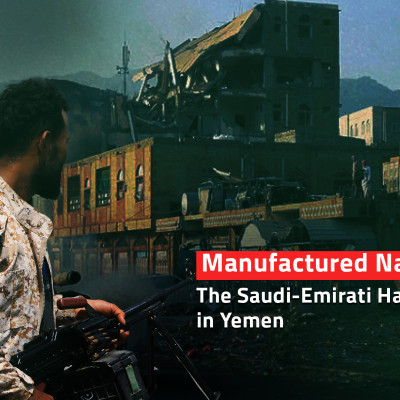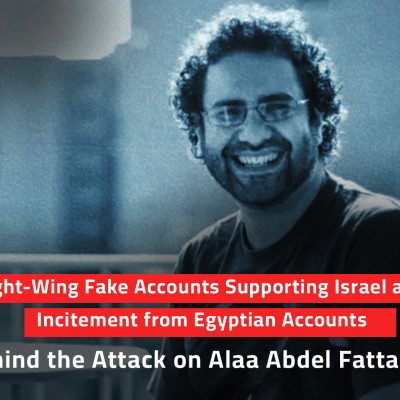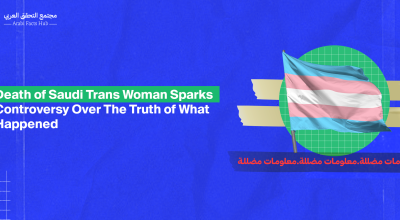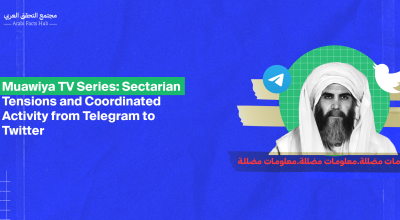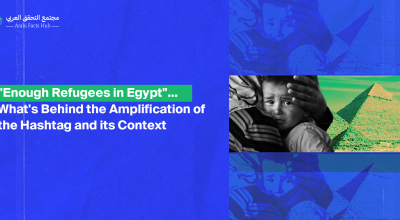Chants Against Al Organi in Egypt Spark A Coordinated Campaign in His Defense
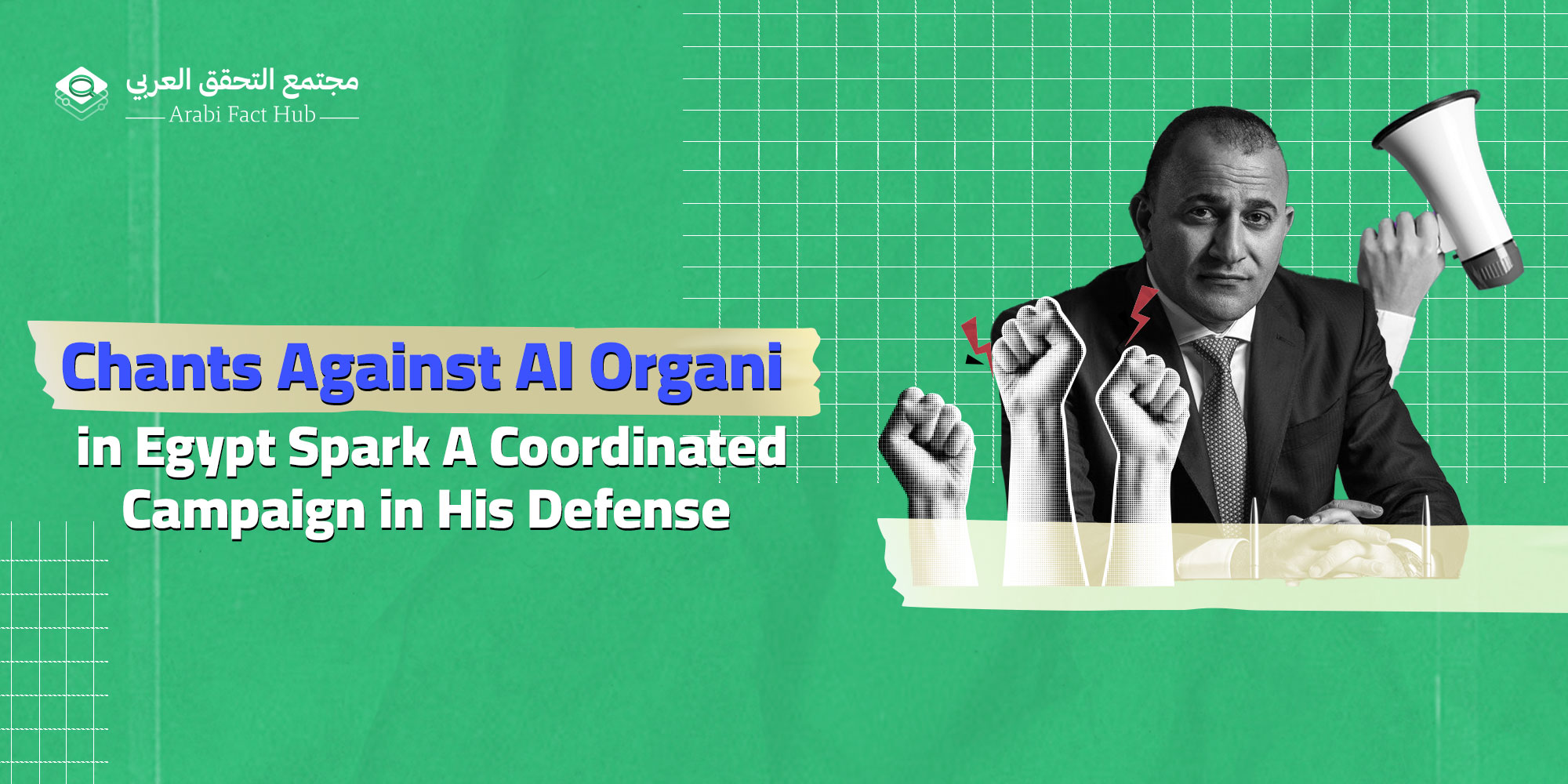
A PR campaign to defend businessman Ibrahim Al Organi coincided with the arrest of participants in a protest outside the Journalists' Syndicate, where chants against him were heard. The campaign, mainly led by fake accounts, also included YouTubers and social media influencers previously involved in promotional efforts for the Egyptian president.
_____________________________________________________________________________
Since the outbreak of the war on Gaza, controversy intensified around Ibrahim Al Organi, leader of the semi-military "Sinai Tribal Union" formed in 2014 to support the army's operations against ISIS militants in the Sinai Peninsula. During a protest on the steps of the Journalist Syndicate in Cairo, chants such as "Al Organi and Hala, you're agents of the Zionists" rang out, linking the desperate plight of Palestinians wanting to leave Gaza with the role of one of Al Organi’s companies, Hala Consulting and Tourism Services. This company, specializing in paid "security coordination services," facilitates the exit of individuals from Gaza through the Rafah crossing into Egypt.
Founded in 2019, Hala has offices in both Gaza and Egypt. The company promises its clients "swift and efficient processing within three days," in stark contrast to the months-long wait times which ordinary travelers face. According to one of Hala’s Facebook posts, the company offers a "VIP lounge for all our travelers at the Rafah crossing." Just hours after the protest, security forces arrested several participants, leading to negative comments about Al Organi's influence. Al Organi, who was detained by Egyptian authorities during the regime of former President Hosni Mubarak, has since become an ally in the fight against armed groups in the Sinai Peninsula.
As of April 29, the name Ibrahim Al Organi appeared in 15,092 posts, viewed 4.58 million times, according to Meltwater social media analysis tool statistics. The highest volume of posts about Al Organi occurred on April 4, with a total of 5,149 posts, coinciding with the authorities' crackdown on some protest participants.
Tweets containing the name Ibrahim Al Organi in April 2024 – Meltwater
Controversial personality and influencers
Throughout the Israeli war on Gaza, particularly this past January, Palestinians in Gaza have shared numerous testimonies on social media about the fees charged by security coordination companies to facilitate their exit through the Rafah crossing. An investigation titled "The Price of Escape," conducted in partnership between Sahih Misr and the Organized Crime and Corruption Reporting Project (OCCRP), and published by the French newspaper Le Monde, revealed details about the "trade of security coordination companies for passage through the Rafah crossing." Leading these companies is Hala, owned by Al Organi.
According to the investigation, the permit fees sold by coordination companies have surged since the outbreak of the war, ranging from $4,500 to $10,000 for Palestinians, and from $650 to $1,200 for Egyptian nationals in Gaza.
The controversy surrounding Al Organi also flared up during an incident involving a private plane from Cairo that was stopped by authorities in Zambia last August; reports mentioned millions of dollars and quantities of gold on board. The debate over Al Organi, who recently became an official sponsor of Al Ahly Club, intensified after a television ad aired last Ramadan, promoting “Al Organi Group, the largest economic entity in the New Republic," consisting of at least 16 companies.
A Broader Look at the Periods When Ibrahim Al Organi Was Discussed Since the Start of 2024 – Meltwater
Focus on Al Organi had quieted somewhat until chants by Gaza supporters at the Journalist Syndicate brought him back into the spotlight. In response, YouTubers and social media influencers, recognized for their involvement in smear campaigns and political propaganda, came to Al Organi’s defense. These influencers started defending Al ORgani by appearing in videos and posting comments attacking his critics. Among them was Mohamed Nour, whose Facebook page "Awareness is Light" has one million followers, and who is followed by 24,700 people on X (formerly Twitter). Nour heavily relies on live streams and video clips in his online campaigns, using clickbait titles to attract viewers to his content.
In his defense of Al Organi, Nour promoted a populist and unreliable narrative, claiming that "Ibrahim Al Organi received offers from Mossad,in 2013 and for years after, to lead terrorist organizations in Sinai and become the head of the Sinai Province."
Nour used derogatory terms like “a bunch of thugs, failures, troublemakers, the lowly gang” while attacking those who chanted against Al Organi. On the morning of April 4th, Louay El Khatib, a promoter of Sisi's policies, posted about Sheikh Ibrahim Al Organi’s right to pursue legal action against the protest participants and criticized the chants against the Israeli embassy in Egypt. That same evening, Nour reiterated his attacks on those detained by the authorities, saying, “They incited the killing and burning of the Israeli embassy. Of course, we all hope for divine retribution against them, but calling for burning an embassy and killing an ambassador as the first demand of the masses? Don’t you realize that means you’re planning a terrorist attack that would lead to international condemnation of Egypt and its security forces?”
On April 13th, opposition journalist Osama Gaweesh spread false information, prompting other influencers who support the president—such as Ahmed Mubarak, Mahmoud Tolba, and Mohamed Nour—to simultaneously defend Hala and Al Organi. They cited video clips used by Gaweesh, which were taken from a page purportedly belonging to Hala. Later, Gaweesh apologized for the previous video, acknowledging that the screenshots were not related to the company. He stated that he had deleted the video but emphasized that this did not invalidate the testimonies about Al Organi's involvement in facilitating passage through the Rafah crossing for millions of dollars.
The influencers defending Al Organi share a political alignment in favor of Sisi's regime. They have previously participated in campaigns supporting the Egyptian president, appeared in several of his tours, and have been the subject of previous reports by the Arabi Facts Hub. These reports highlighted the roles of these influencers in various campaigns, including the campaign to grant Sisi a mandate. Additionally, they attended the Egyptian Family Iftar (President’s Iftar) last Ramadan.
Advanced fake accounts
In the second half of April, Al Organi's campaign took a new turn by employing fake accounts previously involved in government promotional campaigns and cross-border activities. The latest of these was related to the Iranian strikes on Israel, investigated by Arabi Facts Hub. The use of these fake accounts is evidence of the advanced techniques recently employed in orchestrating electronic campaigns in Egypt. The content of the campaign promoting Al Organi reflects a clear interest by the managers of these fake accounts in ensuring the content is varied and not repetitive as well as minding the tone of these messages. Diverging from the classical technique, these accounts do not rely on repetitive texts, which make it easy for followers to identify an orchestrated campaign. Instead, these accounts avoid posting identical content and do not flood the topic with excessive posts. This is compensated by using numerous accounts to amplify hashtags and subjects, pushing them into trending topics or bringing them into the limelight. To add credibility and make the accounts appear as if they belong to real people, posts are varied between entertainment, sports, religion, quotes, and proverbs. Occasionally, coordinated political posts are interspersed among other topics, giving the accounts a more "authentic" feel and keeping them out of suspicion.
Prominent hashtags involved in the campaign included: #Egypt_the_Region’s_Safety_Valve, #The_Last_Chance, #No_To_Escalation_in_the_Region, #With_You_Sisi_100Million_Times, #President_Sisi’s_Inauguration.
The majority of these accounts were created in 2023, although some date back to earlier years, such as 2013 and 2017. Some accounts include geographic locations in their profile information to lend them additional credibility and create the impression that they belong to real people.
X flagged several of these accounts, stating that it limited the reach of their content due to their abnormal activity. The platform takes restrictive measures against accounts engaging in coordinated, inauthentic activities as part of electronic campaigns.
These accounts retweet and reply to each other's posts to amplify content and create the illusion of widespread support for a particular issue or individual. This is corroborated by Meltwater statistics, which show that 89.3% of the posts about Al Organi in April were retweets, while original posts made up only 2.4% of the total.
An AI Video of Adel Imam
As part of the PR campaign for Al Organi, fake accounts contributed to spreading a fabricated video created using AI technology. Not many copies of the video circulated, except for the version posted by @equeen2020, who identifies as a "social influencer." This might suggest a significant role played by this account, which uses a stock image as a profile picture.
The video featured a character resembling actor Adel Imam, defending Ibrahim Al Organi. The creators likely used advanced techniques to mimic Imam's appearance. However, closer inspection reveals inconsistencies, such as lip syncing not matching the audio, errors in the appearance of the left eye, and the voice. The video, which was reposted and amplified by the same network of fake accounts, was viewed over 1.2 million times on X. The fake accounts interacted with @equeen2020, commenting on the video to create the impression that it was genuine.
























